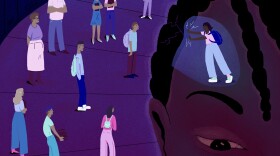
David DesRoches
ReporterDavid finds and tells stories about education and learning for WNPR radio and its website. He also teaches journalism and media literacy to high school students, and he starts the year with the lesson: “Conflicts of interest: Real or perceived? Both matter.” He thinks he has a sense of humor, and he also finds writing in the third person awkward, but he does it anyway.
He's won some awards. He's lost some, too. Winning is better, but does it really matter? What matters is the work and its impact. Here are some of his stories that matter: special education; toxic PCBs in schools; hate crime; environmental damages; students with emotional disabilities suspended at high rates; sexual assault cover-up; deaf children and the choices their parents face.
He believes that journalism should hold the powerful to account and shed light on misunderstood and underserved populations. Much of his work has focused on people with disabilities. His coverage of systemic civil rights violations by a wealthy public school system against students with disabilities ended in numerous resignations and state legislation to address the flaws exposed. His report on toxic PCBs in aging schools for Reveal led two senators to independently call for an investigation into the EPA. The documentary on deafness, called “Making Sense,” has been described as the most multimedia project in the 40-plus year history of Connecticut Public.
The intersection of race, disability, and behavior is also a topic of interest, as are the various forms of cultural expression, and how they're often mischaracterized and misunderstood.
In addition to education coverage, he's reported on environmental topics, such as human waste and the use of biosolids on farms, and a dangerous publicly-funded pesticide program. He's also reported on sexual assault cases; prosecutorial misconduct during a hate crime trial; the aftermath of the Michael Brown shooting-death in Ferguson, Mo. Some of these stories have led to congressional investigations and actual legislation at the state level. His work has appeared on NPR, Reveal from the Center for Investigative Reporting, and numerous local and regional newspapers.
-
State lawmakers in the House of Representatives passed a bill that would require schools to teach African American and Latino history to high school…
-
As she sat with her newborn in the hospital bed after a long and painful labor, an exhausted Corrine Walters held her son close, rocking him in her tired…
-
It’s still hard for Keyanna Tucker to talk about what happened to her when she was six.“I was molested,” Tucker said. “I didn’t know how to cope with it ……
-
A big part of the so-called American Dream promises that if people work hard enough -- no matter how poor they are -- they’ll find success. It turns out…
-
A new report by the National Education Association, the nation's largest teachers union, says that Connecticut's charter school laws need to be…
-
Four years ago, Hartford school officials decided to try to reduce the numbers of students being suspended. So they implemented what's known as a…
-
The state's new assessment for future teachers is biased against people of color and low-income students, according to a group of UConn professors, who…
-
A large majority of teachers say that climate change should be taught in schools, according to a new NPR - Ipsos poll. But the same poll that found that…
-
When it comes to philanthropic giving to public schools, the hype is always big. Like when Facebook founder Mark Zuckerberg announced on Oprah Winfrey’s…
-
After months of uncertainty the debate over tolls finally has some numbers to work with. Wednesday, the Lamont administration unveiled the plan they'd put…










